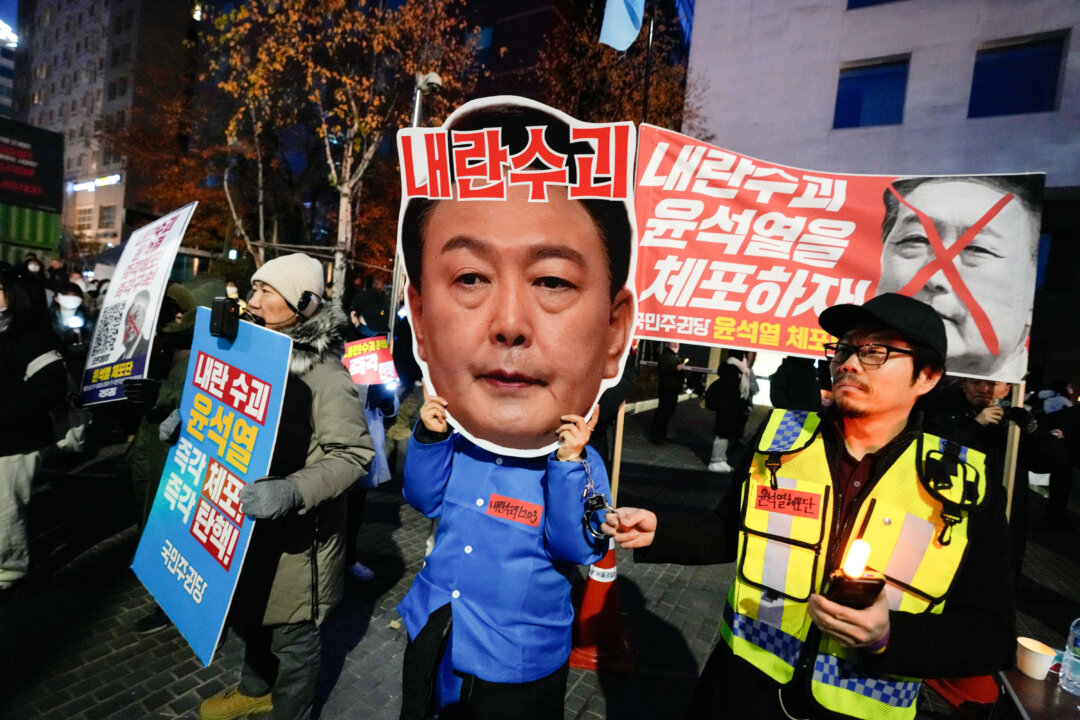President Yoon Suk Yeol has apologized for declaring martial law on Dec. 3 but has not stepped down from his post.
South Korea’s parliament passed a bill on Dec. 10 to appoint a special counsel to investigate President Yoon Suk Yeol’s attempt to impose martial law.
Out of 287 parliamentarians who attended the session, 209 lawmakers voted in favor of passing the bill, 64 voted against, and 14 abstained, according to the Yonhap News Agency in Seoul.
The main opposition Democratic Party called for the special counsel investigation, arguing that public prosecutors cannot be trusted to conduct a thorough investigation of Yoon, who was formerly prosecutor-general.
The Justice Ministry has also banned Yoon and eight others from leaving the country as authorities investigate whether their acts amount to rebellion.
Yoon has apologized for last week’s declaration of martial law and said he will leave his fate to his People Power Party (PPP). He has not yet resigned.
“This declaration stemmed from my sense of urgency as the president, who bears the ultimate responsibility for state affairs,“ Yoon said on Saturday. “However, I caused anxiety and inconvenience to the citizens in the process. I feel deeply apologetic and sincerely apologize to the citizens who were greatly alarmed.”
Lee Yang-soo, who chairs the PPP task force established this week to plan Yoon’s departure, said his team proposed that the president resign in February or March of next year, followed by a snap election two months later.
The constitution requires an election within 60 days of his departure if Yoon leaves office before his five-year term ends in May 2027.
“We’ve not yet reached a conclusion party-wide and will have another meeting with all our members of parliament in the afternoon to discuss that plan,” Lee said.
Details of what happened during the brief declaration of martial law on Dec. 3 have started to emerge.
Kwak Jong-geun, the commander of the Army Special Warfare Command, told a parliamentary committee that he received multiple telephone calls from Yoon as the events unfolded after the declaration.
“He said break the door down right now and get in there and drag out the people inside,” Kwak said, referring to members of parliament who were gathering inside the main chamber to vote on ordering Yoon to rescind the martial law order.
Kwak said he opted not to execute Yoon’s order, and the president rescinded martial law six hours after the vote in parliament.
The special forces commander’s testimony differed from earlier statements by military officers, who claimed that it was the then-defense minister, Kim Yong-hyun, who gave the order to remove lawmakers from the parliament chamber.
Kim has since resigned and has been arrested. He has been accused of recommending martial law to Yoon and sending troops to the National Assembly to block lawmakers from voting on it.
Enough lawmakers eventually managed to gain entry to a parliament chamber and unanimously rejected Yoon’s declaration, forcing the Cabinet to lift martial law before dawn on Dec. 4.
In a statement, Kim said all responsibility for the imposition of martial law rests solely with him, before pleading for leniency toward the soldiers who took part.
Since taking office in 2022 for a single five-year term, Yoon, a conservative, has been on a collision course with his liberal rivals who control the country’s parliament.
Liberal lawmakers have brought motions to impeach his top officials and embarked on an aggressive political campaign against Yoon.
Yoon said the country’s parliament was a “den of criminals” bogging down state affairs when he declared martial law, and said he would eliminate “shameless North Korea followers and anti-state forces.”
The Associated Press and Reuters contributed to this report.

